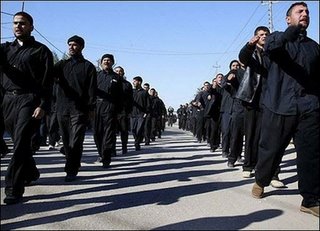
Shiite Clerics' Rivalry Deepens In Fragile Iraq
By Sudarsan Raghavan
Washington Post Foreign Service
Thursday, December 21, 2006; A01
....................................
They question whether Hakim can counter Sadr's growing street power without worsening the chaos. As President Bush ponders limited alternatives in forging a new approach in Iraq, some wonder whether the United States is overestimating Hakim's ability.
The U.S. embrace of Hakim "will deepen their rivalry," said Mahmoud Othman, an independent Kurdish legislator. "And it will deepen the rifts between the United States and the Sadrists."
.......................................
'Pouring Their Poison In'
Inside the Sayyed Idris mosque, a large shrine in Karrada with an ornate blue-and-yellow tiled minaret, Haji Abbas al-Zubaidi is a witness to this changing world.
For years, the picture of Hakim's white-bearded brother, Ayatollah Mohammed Bakir Hakim, who was killed by a car bomb in 2003, hung in the mosque's library along with images of Sistani and a collection of revered Shiite saints. Now, pictures of Sadr and his father hang along with them.
Baghdad's sectarian strife now rules Zubaidi's life. In recent weeks, car bombs and mass kidnappings have rocked his neighborhood. Zubaidi, who has lived in Karrada for 35 years, sees the Mahdi Army, not the Badr Organization, as his main source of protection. It has created "popular protection committees" that watch over blocks, as they do in the Mahdi Army's
stronghold of Sadr City.
"The terrorists are pouring their poison into our neighborhood," said Zubaidi, slim with long, slender fingers and a narrow face, as he sat on a large red carpet inside the mosque. "The sons of Karrada who have joined the popular committees and the Mahdi Army are now 98 percent in control. We have noticed that many of the attempts have been foiled."
Zubaidi and other educated Karrada residents continue to obey Sistani's pacifist vision and view him as their preeminent leader. But younger Shiites, while still revering Sistani, have switched their allegiances.
"We imitate and follow Sayyed Sistani," said Zubaidi, using an honorific for Sistani. "As for the field commanders and the young men, they are followers of Moqtada Sadr."
.....................................
In many circles, Iraqis question whether Hakim and other so-called moderates can curb the growing power of Sadr.
"I have serious doubts about Mr. Hakim's influence among the Shiites, and I have serious doubts of Hashemi becoming the leader of Sunnis," Nadhmi said.
It's a sentiment shared in Karrada. "Al-Hakim is not loved by the people," said Abdul Amir Ali, a burly Shiite shopkeeper. "People love the Islamic Dawa Party and Maliki because they don't have militias."
In the sidewalk restaurant where Sadr's poster hangs, its owner, Ali Hussein, points at clusters of young men nearby. They are all Mahdi Army, he said. And so is he.
Hakim, he said, made a fatal mistake by meeting Bush. In today's Iraq, credibility and power are measured by opposition to the United States.
"At this time, whoever has his hands with the Americans or Jews is not an Iraqi," said Hussein, as he chopped up cubes of lamb. "So how could Hakim put his hands with the Americans? There will be tensions because Sayyed Moqtada Sadr is a revolutionary man, like his father. Even if Hakim tries to come back to Sadr, Sadr will never receive his hand."
If the rift between Hakim and Sadr deepens, moderate Shiites fear, all Iraqis may suffer. "It should not leave any shadow on a fragile situation on Iraq," said Dabbagh, the government spokesman. "Iraq cannot absorb such a shock."
No comments:
Post a Comment